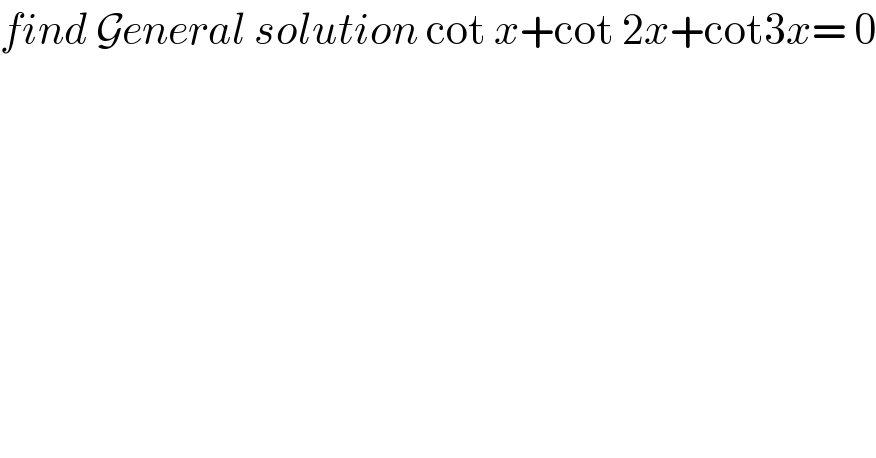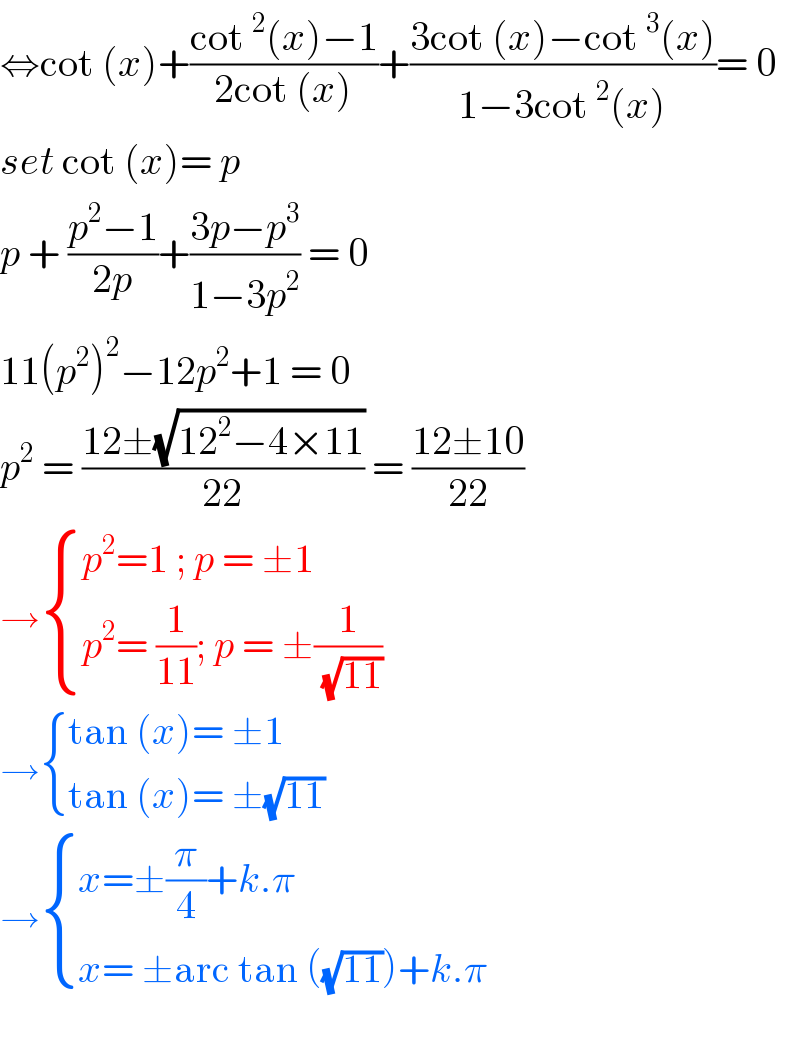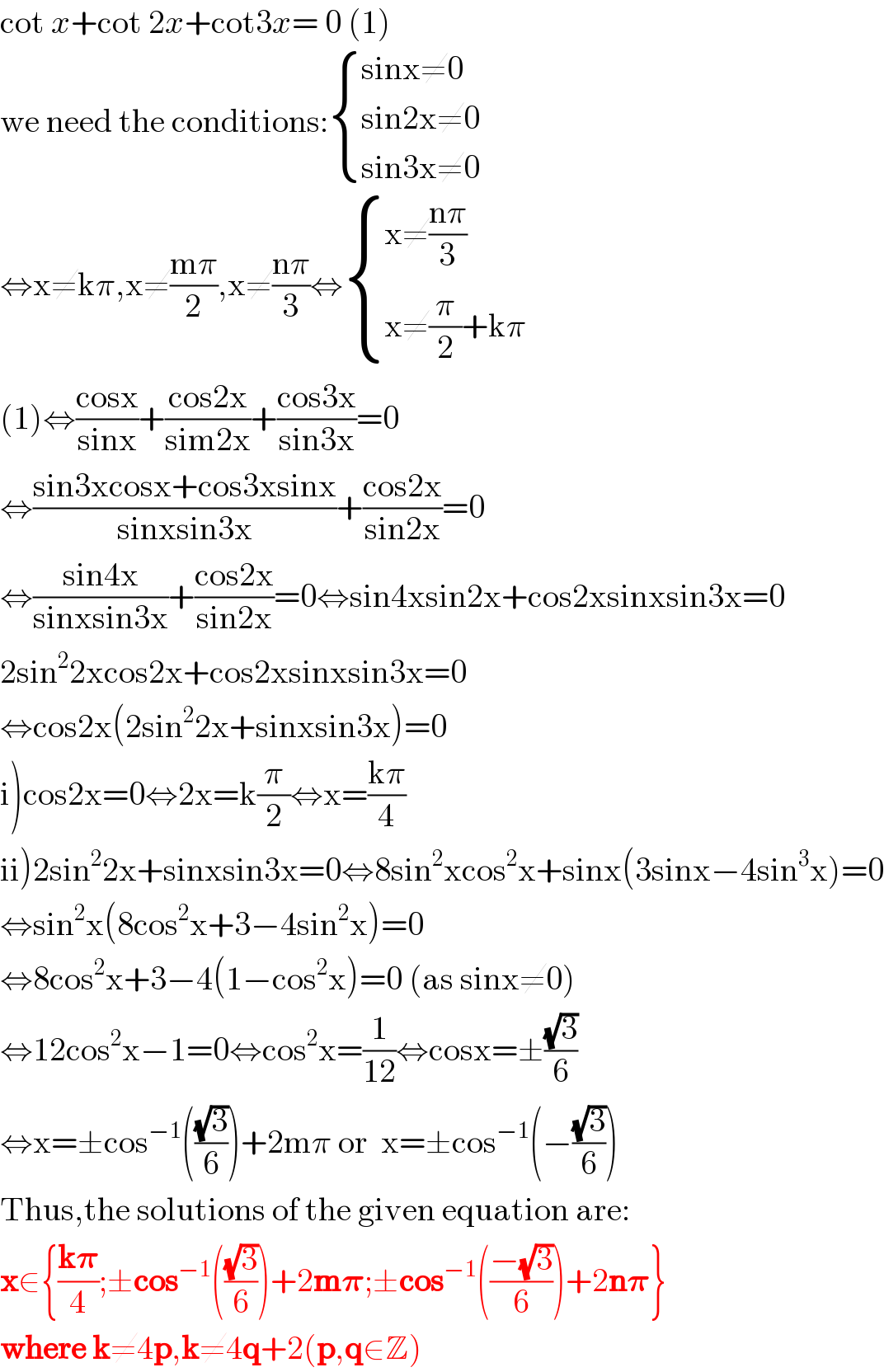
Question Number 105619 by bobhans last updated on 30/Jul/20

$${find}\:\mathcal{G}{eneral}\:{solution}\:\mathrm{cot}\:{x}+\mathrm{cot}\:\mathrm{2}{x}+\mathrm{cot3}{x}=\:\mathrm{0} \\ $$$$ \\ $$
Answered by bemath last updated on 30/Jul/20

$$\Leftrightarrow\mathrm{cot}\:\left({x}\right)+\frac{\mathrm{cot}\:^{\mathrm{2}} \left({x}\right)−\mathrm{1}}{\mathrm{2cot}\:\left({x}\right)}+\frac{\mathrm{3cot}\:\left({x}\right)−\mathrm{cot}\:^{\mathrm{3}} \left({x}\right)}{\mathrm{1}−\mathrm{3cot}\:^{\mathrm{2}} \left({x}\right)}=\:\mathrm{0} \\ $$$${set}\:\mathrm{cot}\:\left({x}\right)=\:{p} \\ $$$${p}\:+\:\frac{{p}^{\mathrm{2}} −\mathrm{1}}{\mathrm{2}{p}}+\frac{\mathrm{3}{p}−{p}^{\mathrm{3}} }{\mathrm{1}−\mathrm{3}{p}^{\mathrm{2}} }\:=\:\mathrm{0} \\ $$$$\mathrm{11}\left({p}^{\mathrm{2}} \right)^{\mathrm{2}} −\mathrm{12}{p}^{\mathrm{2}} +\mathrm{1}\:=\:\mathrm{0} \\ $$$${p}^{\mathrm{2}} \:=\:\frac{\mathrm{12}\pm\sqrt{\mathrm{12}^{\mathrm{2}} −\mathrm{4}×\mathrm{11}}}{\mathrm{22}}\:=\:\frac{\mathrm{12}\pm\mathrm{10}}{\mathrm{22}} \\ $$$$\rightarrow\begin{cases}{{p}^{\mathrm{2}} =\mathrm{1}\:;\:{p}\:=\:\pm\mathrm{1}}\\{{p}^{\mathrm{2}} =\:\frac{\mathrm{1}}{\mathrm{11}};\:{p}\:=\:\pm\frac{\mathrm{1}}{\sqrt{\mathrm{11}}}}\end{cases} \\ $$$$\rightarrow\begin{cases}{\mathrm{tan}\:\left({x}\right)=\:\pm\mathrm{1}}\\{\mathrm{tan}\:\left({x}\right)=\:\pm\sqrt{\mathrm{11}}}\end{cases} \\ $$$$\rightarrow\begin{cases}{{x}=\pm\frac{\pi}{\mathrm{4}}+{k}.\pi}\\{{x}=\:\pm\mathrm{arc}\:\mathrm{tan}\:\left(\sqrt{\mathrm{11}}\right)+{k}.\pi}\end{cases} \\ $$$$ \\ $$
Answered by 1549442205PVT last updated on 30/Jul/20

$$\mathrm{cot}\:{x}+\mathrm{cot}\:\mathrm{2}{x}+\mathrm{cot3}{x}=\:\mathrm{0}\:\left(\mathrm{1}\right) \\ $$$$\mathrm{we}\:\mathrm{need}\:\mathrm{the}\:\mathrm{conditions}:\begin{cases}{\mathrm{sinx}\neq\mathrm{0}}\\{\mathrm{sin2x}\neq\mathrm{0}}\\{\mathrm{sin3x}\neq\mathrm{0}}\end{cases} \\ $$$$\Leftrightarrow\mathrm{x}\neq\mathrm{k}\pi,\mathrm{x}\neq\frac{\mathrm{m}\pi}{\mathrm{2}},\mathrm{x}\neq\frac{\mathrm{n}\pi}{\mathrm{3}}\Leftrightarrow\begin{cases}{\mathrm{x}\neq\frac{\mathrm{n}\pi}{\mathrm{3}}}\\{\mathrm{x}\neq\frac{\pi}{\mathrm{2}}+\mathrm{k}\pi}\end{cases} \\ $$$$\left(\mathrm{1}\right)\Leftrightarrow\frac{\mathrm{cosx}}{\mathrm{sinx}}+\frac{\mathrm{cos2x}}{\mathrm{sim2x}}+\frac{\mathrm{cos3x}}{\mathrm{sin3x}}=\mathrm{0} \\ $$$$\Leftrightarrow\frac{\mathrm{sin3xcosx}+\mathrm{cos3xsinx}}{\mathrm{sinxsin3x}}+\frac{\mathrm{cos2x}}{\mathrm{sin2x}}=\mathrm{0} \\ $$$$\Leftrightarrow\frac{\mathrm{sin4x}}{\mathrm{sinxsin3x}}+\frac{\mathrm{cos2x}}{\mathrm{sin2x}}=\mathrm{0}\Leftrightarrow\mathrm{sin4xsin2x}+\mathrm{cos2xsinxsin3x}=\mathrm{0} \\ $$$$\mathrm{2sin}^{\mathrm{2}} \mathrm{2xcos2x}+\mathrm{cos2xsinxsin3x}=\mathrm{0} \\ $$$$\Leftrightarrow\mathrm{cos2x}\left(\mathrm{2sin}^{\mathrm{2}} \mathrm{2x}+\mathrm{sinxsin3x}\right)=\mathrm{0} \\ $$$$\left.\mathrm{i}\right)\mathrm{cos2x}=\mathrm{0}\Leftrightarrow\mathrm{2x}=\mathrm{k}\frac{\pi}{\mathrm{2}}\Leftrightarrow\mathrm{x}=\frac{\mathrm{k}\pi}{\mathrm{4}} \\ $$$$\left.\mathrm{ii}\right)\mathrm{2sin}^{\mathrm{2}} \mathrm{2x}+\mathrm{sinxsin3x}=\mathrm{0}\Leftrightarrow\mathrm{8sin}^{\mathrm{2}} \mathrm{xcos}^{\mathrm{2}} \mathrm{x}+\mathrm{sinx}\left(\mathrm{3sinx}−\mathrm{4sin}^{\mathrm{3}} \mathrm{x}\right)=\mathrm{0} \\ $$$$\Leftrightarrow\mathrm{sin}^{\mathrm{2}} \mathrm{x}\left(\mathrm{8cos}^{\mathrm{2}} \mathrm{x}+\mathrm{3}−\mathrm{4sin}^{\mathrm{2}} \mathrm{x}\right)=\mathrm{0} \\ $$$$\Leftrightarrow\mathrm{8cos}^{\mathrm{2}} \mathrm{x}+\mathrm{3}−\mathrm{4}\left(\mathrm{1}−\mathrm{cos}^{\mathrm{2}} \mathrm{x}\right)=\mathrm{0}\:\left(\mathrm{as}\:\mathrm{sinx}\neq\mathrm{0}\right) \\ $$$$\Leftrightarrow\mathrm{12cos}^{\mathrm{2}} \mathrm{x}−\mathrm{1}=\mathrm{0}\Leftrightarrow\mathrm{cos}^{\mathrm{2}} \mathrm{x}=\frac{\mathrm{1}}{\mathrm{12}}\Leftrightarrow\mathrm{cosx}=\pm\frac{\sqrt{\mathrm{3}}}{\mathrm{6}} \\ $$$$\Leftrightarrow\mathrm{x}=\pm\mathrm{cos}^{−\mathrm{1}} \left(\frac{\sqrt{\mathrm{3}}}{\mathrm{6}}\right)+\mathrm{2m}\pi\:\mathrm{or}\:\:\mathrm{x}=\pm\mathrm{cos}^{−\mathrm{1}} \left(−\frac{\sqrt{\mathrm{3}}}{\mathrm{6}}\right) \\ $$$$\mathrm{Thus},\mathrm{the}\:\mathrm{solutions}\:\mathrm{of}\:\mathrm{the}\:\mathrm{given}\:\mathrm{equation}\:\mathrm{are}: \\ $$$$\boldsymbol{\mathrm{x}}\in\left\{\frac{\boldsymbol{\mathrm{k}\pi}}{\mathrm{4}};\pm\boldsymbol{\mathrm{cos}}^{−\mathrm{1}} \left(\frac{\sqrt{\mathrm{3}}}{\mathrm{6}}\right)+\mathrm{2}\boldsymbol{\mathrm{m}\pi};\pm\boldsymbol{\mathrm{cos}}^{−\mathrm{1}} \left(\frac{−\sqrt{\mathrm{3}}}{\mathrm{6}}\right)+\mathrm{2}\boldsymbol{\mathrm{n}\pi}\right\} \\ $$$$\boldsymbol{\mathrm{where}}\:\boldsymbol{\mathrm{k}}\neq\mathrm{4}\boldsymbol{\mathrm{p}},\boldsymbol{\mathrm{k}}\neq\mathrm{4}\boldsymbol{\mathrm{q}}+\mathrm{2}\left(\boldsymbol{\mathrm{p}},\boldsymbol{\mathrm{q}}\in\mathbb{Z}\right) \\ $$
